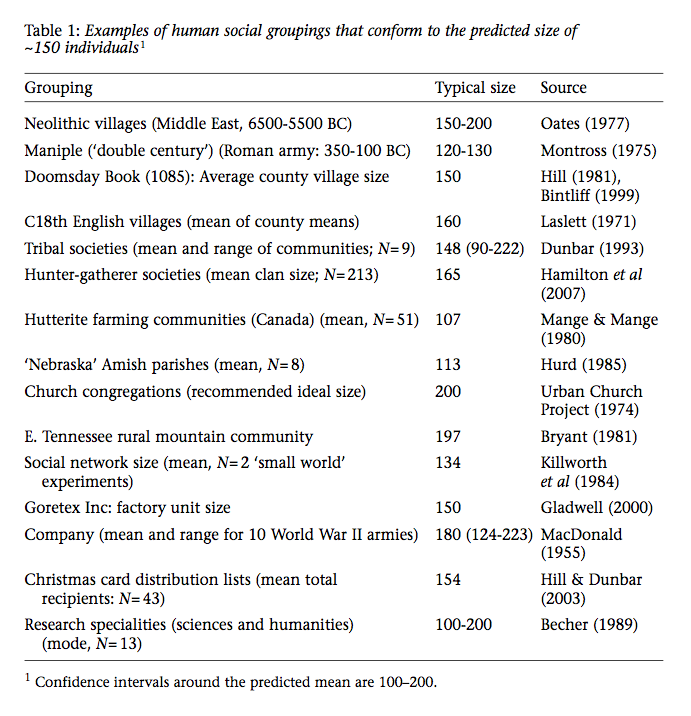The Evolutionary Psychology of Writing
In the latest issue of the British Academy Review, there is an excerpt from Robin Dunbar's 2007 Joint British Academy/British Psychological Society Lecture, appearing under the title "Why Humans aren't just Great Apes" [PDF]. The article begins with Dunbar recapitulating his famous argument for his eponymous number, complete with the following, lovely, table.

The number ~150 was initially obtained by noting the relationship between brain size and social group size in different primate species and extrapolating for humans (measuring the scale and nature of human social networks is obviously extremely difficult—or at least it was before Facebook—and so there remains much dispute about whether the number is accurate). But what is it about brain size that enables the formation of larger social networks? Dunbar speculates that the difference concerns what he (misleadingly) calls theory of mind—the ability to form concepts of the intentional states of others (the label is misleading because there is an ongoing debate in philosophy and cognitive science concerning whether this ability is in fact underwritten by anything resembling a theory. Elsewhere, Dunbar has argued that there are also correlations between memory capacity and other structural properties of human social groups). Call first order intentionality the possession of an intentional state directed towards a non-intentional state of affairs, and then (n)–order intentionality the possession of an intentional state directed at an (n-1)–order intentional state (whether in oneself or another). So for example, my belief that Paris is windy tonight is a first order intentional state, while your belief that I believe that Paris is windy tonight is a second order intentional state, and so on. Dunbar reports research showing that two-thirds of humans are only capable of fifth-order intentionality or below, while three-quarters of us are only capable of sixth-order intentionality or below. So far, so interesting (Dunbar does not mention the heated contest over the existence of chimpanzee theory of mind, the result of which would presumably have significant ramifications for his thesis—hopefully the full lecture, still forthcoming, will elaborate). But then comes exactly the sort of fanciful leap we have come to expect from evolutionary psychologists. And I quote:
Consider the case of the audience watching Shakespeare's Othello. They have to believe that Iago intends that Othello imagines that Desdemona is in love with Cassio, an activity involving four levels of intentionality. However, notice that, at this point, the kind of story they are dealing with is not especially demanding (or, for that matter, particularly enthralling). Why should Othello care if Desdemona fantasises about Cassio? The bottom line of everyday life is that very few of us would be anything but mildly bemused by such a trivial phenomenon, and the story would end there as a dull narrative. What gives Shakespeare's play its bite is the fact that Iago is able to persuade Othello that Cassio reciprocates Desdemona's feelings, thereby creating a romantic triangle and raising the stakes high enough for all of us to be gripped by the drama (especially when, with the benefit of spectator-sight, we are aware of Iago's scheming plan). At this point, of course, the audience is having to work at fifth order intentionality, and is thus at the natural limits for the great majority of the population. But, in putting this story together, Shakespeare himself has to go one level higher than his audience, to sixth order: he has to intend that the audience believes…. I suggest that this might explain why the capacity to enjoy good literature is a widespread human universal, but the ability to compose good literature is not—storytelling demands social cognitive competencies that are beyond the normal range for the great majority of the population. Thus it is that, when we sit down to write those novels we have so long aspired to write, our natural limits at fifth order intentionality constrain most of us into writing dull narratives.
This is nonsense. There is no reason to think that the dullness of narrative corresponds to the level of intentionality required to understand it. There is no reason to think that the difficulty of writing literature varies with the levels of intentionality contained within the text. Indeed, writing non-narrative forms of literature is just as difficult as writing narrative—if not more so (to Dunbar, it appears that literature is equivalent to social storytelling). Moreover, Dunbar's theory entails, absurdly, that comprehending a sixth-order narrative is about as difficult as writing a fifth-order one, and so on down the hierarchy. There is more, but I am bored. Before offering more ridiculous pseudo-explanations of literature and the literary imagination, evolutionary psychologists should turn their carefully selected brain-modules to the question of why we are so much better at producing than evaluating explanations—and, more to the point, why they are themselves so often so clueless about the arts.